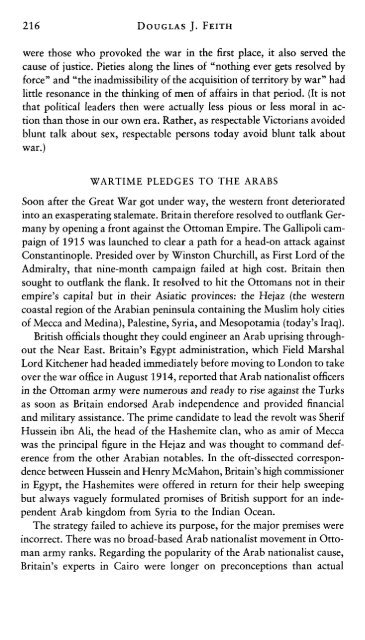Churchill, Palestine and Zionism, 1904-1922 - Douglas J. Feith
Churchill, Palestine and Zionism, 1904-1922 - Douglas J. Feith
Churchill, Palestine and Zionism, 1904-1922 - Douglas J. Feith
Create successful ePaper yourself
Turn your PDF publications into a flip-book with our unique Google optimized e-Paper software.
216 DOUGLAS J. FEITH<br />
were those who provoked the war in the first place, it also served the<br />
cause of justice. Pieties along the lines of "nothing ever gets resolved by<br />
force" <strong>and</strong> "the inadmissibility of the acquisition of territory by war" had<br />
little resonance in the thinking of men of affairs in that period. (It is not<br />
that political leaders then were actually less pious or less moral in action<br />
than those in our own era. Rather, as respectable Victorians avoided<br />
blunt talk about sex, respectable persons today avoid blunt talk about<br />
war.)<br />
WARTIME PLEDGES TO THE ARABS<br />
Soon after the Great War got under way, the western front deteriorated<br />
into an exasperating stalemate. Britain therefore resolved to outflank Germany<br />
by opening a front against the Ottoman Empire. The Gallipoli campaign<br />
of 1915 was launched to clear a path for a head-on attack against<br />
Constantinople. Presided over by Winston <strong>Churchill</strong>, as First Lord of the<br />
Admiralty, that nine-month campaign failed at high cost. Britain then<br />
sought to outflank the flank. It resolved to hit the Ottomans not in their<br />
empire's capital but in their Asiatic provinces: the Hejaz (the western<br />
coastal region of the Arabian peninsula containing the Muslim holy cities<br />
of Mecca <strong>and</strong> Medina), <strong>Palestine</strong>, Syria, <strong>and</strong> Mesopotamia (today's Iraq).<br />
British officials thought they could engineer an Arab uprising throughout<br />
the Near East. Britain's Egypt administration, which Field Marshal<br />
Lord Kitchener had headed immediately before moving to London to take<br />
over the war office in August 1914, reported that Arab nationalist officers<br />
in the Ottoman army were numerous <strong>and</strong> ready to rise against the Turks<br />
as soon as Britain endorsed Arab independence <strong>and</strong> provided financial<br />
<strong>and</strong> military assistance. The prime c<strong>and</strong>idate to lead the revolt was Sherif<br />
Hussein ibn Ali, the head of the Hashemite clan, who as amir of Mecca<br />
was the principal figure in the Hejaz <strong>and</strong> was thought to comm<strong>and</strong> deference<br />
from the other Arabian notables. In the oft-dissected correspondence<br />
between Hussein <strong>and</strong> Henry McMahon, Britain's high commissioner<br />
in Egypt, the Hashemites were offered in return for their help sweeping<br />
but always vaguely formulated promises of British support for an independent<br />
Arab kingdom from Syria to the Indian Ocean.<br />
The strategy failed to achieve its purpose, for the major premises were<br />
incorrect. There was no broad-based Arab nationalist movement in Ottoman<br />
army ranks. Regarding the popularity of the Arab nationalist cause,<br />
Britain's experts in Cairo were longer on preconceptions than actual


